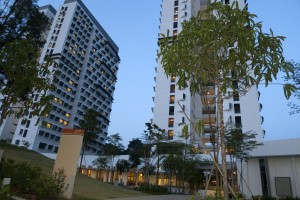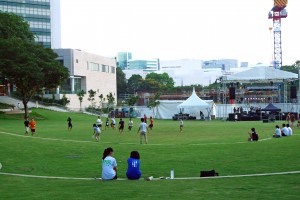There is a pressing need to raise the career preparation skills of NUS graduates. In a recent survey of major employers of graduates in Singapore, 70% opined that NUS graduates are lacking in this area. This is what employers are saying about NUS graduates:
- ‘I was shocked to see an NUS graduate dressed casually in jeans for the interview, thinking that it is appropriate, because it is at Sentosa.’
- ‘Only half of the interviewees did proper research about our company.’ This feedback was received from one of the largest companies in Singapore.
- ‘Students can sell themselves better by putting important things upfront. For example, they should highlight their CAP score if they did well academically. Students are quite shy, and are too modest. They should try to market themselves better and ask more questions.’ This feedback was received from an American MNC.
- ‘Local graduates are excellent at breaking down problems and delivering results. But they undersell themselves and do not get opportunities they deserve as they are being overshadowed by the vocal and domineering personalities from the US.”
- And one of Singapore’s largest graduate recruiters wrote ‘Some candidates were neither prepared nor appropriately dressed for interviews. In terms of ratings of performance among the 3 local universities,
- for Oral Communications: SMU 1, NUS 2, NTU 3;
- for Maturity: SMU 1, NUS 2, NTU 3;
- for Grooming: SMU 1, NTU 2, NUS 3.’
Clearly, this is a gap we need to fill.
What should the university do, and how can we help our graduates?
Let me share more about the current situation.
Career preparation workshops are being offered to students on an optional basis, and they do not carry academic credits. Last year, the NUS Career Centre (NCC) offered a suite of 5 workshops (comprising Career Planning, Resume Writing, Interview Skills, Networking Skills, and Business Etiquette and Corporate Dressing). Each workshop was a 2 to 3 hour session, and students were charged $8 to $10 per workshop. The workshops are offered to students at highly subsidized rates, and a nominal fee is levied to prevent no-shows.
Of the 25,000 undergraduates enrolled at the NUS, only 1,500 students attended at least one workshop, and amongst them, 320 of them attended all 5 workshops. Of the 320 students who completed the suite of workshops, about 150 are from Pharmacy, because they had an astute Head of Department, who saw the importance of the workshops, and had made them compulsory for final year Pharmacy students.
Should we then mandate the workshops as a compulsory graduation requirement? If we maintain status quo, the take-up rate of the career preparation workshops is not likely to improve. Interestingly, in a recent survey involving more than 3,000 NUS students, 56% supported the idea of the university implementing compulsory career preparation workshops; 11% of the respondents were unsupportive. At the NUS Business School, career preparation workshops are not compulsory. Yet, students prioritize these learning opportunities and nearly 95% of their students elect to attend them sequentially over 3 to 4 years.
We then sought to understand why NUS students are not signing up to attend career preparation workshops. The student survey further revealed that top 3 reasons were:
- I do not have time! (40%)
- The workshops clash with my lectures/tutorials. (25%) We were certainly puzzled by this response as many workshops are held on weekends.
- I am not aware of these career development workshops. (25%)
After much deliberation, we have decided to defer the ‘compulsion’ measure for now, and will instead adopt a moderate approach.
Over the next 3 years, we will nudge all students from the Faculties/Schools of Arts and Social Sciences, Computing, Design and Environment, Engineering and Science, to complete the suite of 5 workshops. The workshops will be offered free-of-charge.
Here are the implementation plans:
(1) An Opt-Out System for Freshmen
- Each freshman will be assigned to attend the 5 workshops in one of the two semesters in AY2012/13. Students who do not wish to attend will have to provide good reasons to the NCC.
(2) An Opt-In System for the Graduating Cohort
- For existing students, career preparation workshops will be offered to you in your graduating year, and we will facilitate your attendance by ensuring that the workshop schedules do not clash with your formal classes. You will have to register to attend these workshops.
To conduct these programs on a large scale, the NCC will be recruiting more career counsellors; many workshops will also be outsourced to competent vendors. Notes and resource materials will be prepared and made available online, so that the workshops are more hands-on and practice-oriented. On top of the 5 first-tier career preparation workshops, the NCC will also offer many additional courses under the umbrella of the ‘Future Ready Programme’. Some target specific skills; others are industry-specific.
The workshops by themselves are no guarantee that NUS graduates will become expert job hunters after attending them. But, our aim is to sensitize our students, right at the onset of their university life, to the importance of planning and preparing for their future careers. Better earlier than later, as students can then start to think and plan their curriculum, education and projects accordingly, to hone expertise and experience and to develop a credible portfolio towards their career goals.
For students who do not have stellar CAP scores, please do not give up, or be overly discouraged. It is heartening to note that many top employers such as Credit Suisse, Goldman Sachs, Keppel Corporation, Proctor & Gamble, ExxonMobil and others, have shared that they are moving away from CAP to look at strong CCA qualities and soft skills. One firm shared that ‘We do not look at grades, but how the graduates present themselves. Core values such as integrity, and encouraging a non-defeatist, positive attitude is vital to success in society.’ Do take heart, and press on with your job hunt.
In short, we will be making career preparation workshops as accessible and convenient for students to attend them, and in so doing, we hope to ‘nudge’ students towards making beneficial decisions. We sincerely hope that our students will take up these opportunities to enrich themselves, and to enhance their employability.


